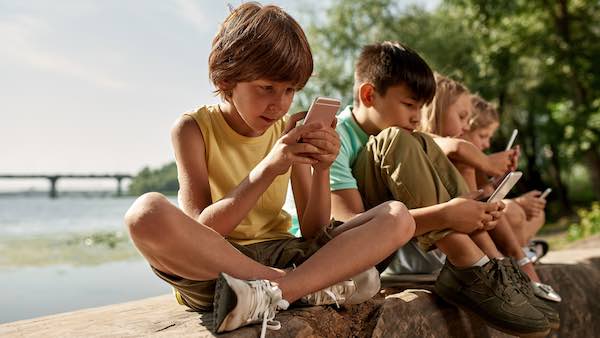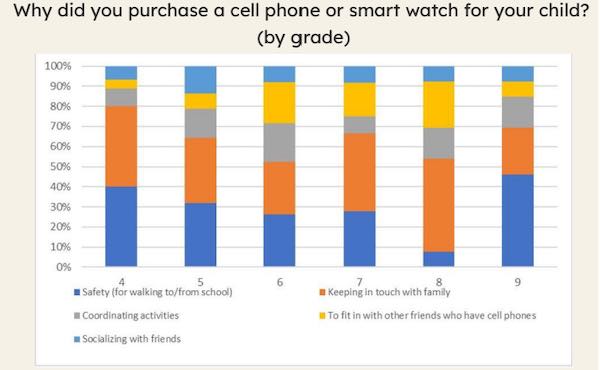Scarsdale Parents Band Together to Sign the Wait Until 8th Pledge
- Thursday, 02 May 2024 11:58
- Last Updated: Thursday, 02 May 2024 18:06
- Published: Thursday, 02 May 2024 11:58
- Wendy MacMillan
- Hits: 3197
 The “Wait Until 8th” pledge, a movement by parents to delay getting a smartphone for their children until the end of 8th grade, is gaining momentum within our Scarsdale community. Last week, Social Worker Lauren Tetenbaum Dorman wrote a Letter To The Editor in which she described the pledge as one way that parents can work together to help our children to be happy, healthy, inclusive, included, and safe.
The “Wait Until 8th” pledge, a movement by parents to delay getting a smartphone for their children until the end of 8th grade, is gaining momentum within our Scarsdale community. Last week, Social Worker Lauren Tetenbaum Dorman wrote a Letter To The Editor in which she described the pledge as one way that parents can work together to help our children to be happy, healthy, inclusive, included, and safe.
This week we have learned that parents from kindergarten through 5th grade are banding together and promising to sign the Wait Until 8th pledge including families from Quaker Ridge with students in second grade and fourth grade, families from Greenacres with students in Kindergarten, first grade, thirrd grade and fifth grade, and families at Fox Meadow with students in first grade.
We reached out to Sharon Mayeri Chesler, a Greenacres parent who is helping to spearhead the movement here in Scarsdale for more information about the pledge and why she thinks it is important for our children and our community.
Why is taking the Wait Until 8th pledge important to you and your family?
Chesler: “I see the harm that comes from kids having access to smartphones -- it's addictive (adults have trouble putting their phones down) and distracting, there is access to inappropriate content, and kids can be cruel (in general) and that is exacerbated by the ability to do it anonymously. I understand the need to give your child a phone so you can contact them if they want to stay late after school, but that doesn't require them to have access to a smartphone or unlimited texting.”
Why do you think others should join you in the pledge?
Chesler: “There was a tech discussion at SMS a few months ago and they showed this chart:

The fact that in sixth, seventh and eighth grade 10%-15% of the reason kids got phones was to fit in with other friends who have cell phones, really resonated with me. This is something we can fix if we work together as a community to make our kids healthier and happier.”
Do you have a sense of how many people at Greenacres are willing to take the pledge?
Chesler: “Yes, right now we have 29% of 5th graders, 28% of third graders and 41% of Kindergarteners who have signed. I think the earlier we start sharing this pledge with parents the better. We need the PTA and School District to help us get the word out -- so that when kids get to middle school this isn't the norm.”
Kristen Zakierski, another Greenacres parent, said she is happy to sign the pledge because, “Our primary job as parents is to keep our kids safe - physically and psychologically. The negative impact of smartphones is abundantly clear and delaying their access and educating them about technology is part of that job. It was a no-brainer to me and my husband to make this pledge.”
It seems Zakierski and Chesler are not alone in their concerns about young children having access to too much technology.
Ariana Green, a mother of three in Fox Meadow writes: "At Fox Meadow, we are starting a new group, Go Slow on Tech, because norms around here must change. Scarsdale parents are giving kids devices and access to platforms much too early. Friends with middle schoolers and high schoolers I've spoken with in cities throughout the country say where they live parents are scaling back and only giving their kids flip phones. It's time for that here.
The data is in: The social media-addicted guinea pig kids are not alright. We want to give kids back their childhoods and parents back their tweens and teens. We are thrilled that Wait Until 8th pledges are active in at least three of the elementary schools [I can confirm FM, QR, GA, could be more], meaning parents agree to wait until at least eighth grade to allow kids to be on social media.
The tech companies have figured out a way to make their platforms engrossing and addictive, especially for kids with developing brains and stronger cravings for social acceptance.
It's normal that not everyone gets invited to the ice cream shop or a sleepover. It's not normal that an eleven year old has to witness being left out in real time, as Snapchat shows everyone's location and then kids post TikTok videos of their group sleepover dates for all to see."
Another parent, Courtney Hunter, detailed for us the real-world reasons she believes delaying access to smartphones is critical to the mental health of our children. She writes, “In my professional capacity, I am the VP, Public Policy for Crisis Text Line and a volunteer crisis counselor. Crisis Text Line is a national nonprofit providing free, 24/7 mental health support and crisis intervention services via text, chat and WhatsApp. We receive approximately 4,000 texts per day mostly from young people struggling with anxiety, depression, stress, and other issues like eating disorders, self harm, and bullying. Through this work, I've gotten a front row seat to the challenges that young people are facing today. Smartphones and social media have exacerbated these challenges. Unfortunately, we experimented on an entire generation of young people's developing brains and the outcomes have been horrific. Suicide is now the second leading cause of death for youth, eating disorders and self harm are on the rise.
The pledge is critically important because the only way to limit the harms of smartphones and social media is through collective action. If we are not fearful of our children being left out, we will be less likely to give in and get them smartphones. It's not about limiting communication, but rather, increasing their ability to develop connection. The lack of in real life connection is what is propelling the mental health challenges and the loneliness epidemic we are currently facing. With smartphones, comes access to the internet and inevitably, social media. Even if the apps are not downloaded, the content can be accessible without accounts and there are no limits on advertising to young people. It's like giving a vape pen to a child and saying "I'm not giving you the cartridges to smoke." They still can find the means to access the harmful content.
We have enough research to know how detrimental smartphones are to developing brains, enough to know now what the tech executives have known for years and why they won't allow their own children to have them. However, what we do with that research is up to us. We have the power and ability to change the trajectory of our children's future if we act together. I'm sure the families that are suing social media companies for the death of their children to suicide, eating disorders, fentanyl poisoning, etc. would like the opportunity that is presented to us now.
In terms of an outcome, I am hoping we can come together as a community and stand united to give our children the best future possible. We have been promoting the pledge through word of mouth and emails to other parents in the community, starting with our children's classmates. The opposition I have heard so far is that it's been a right of passage for those entering middle school (6th grade) to get a smartphone. I think for parents with older children that have already given those children a smartphone, it's hard to walk it back now for their younger children which I totally understand.
My question to those in opposition is "what's the downside?" in signing the pledge if we all act together? And yes, we can all get them flip phones, they still make them.”
Courtney Engel, a parent from Fox Meadow who has also signed the pledge, had this to say: “The Wait til 8th Pledge empowers parents to delay giving children a smartphone until 8th grade. Parents can still give their children smartwatches, basic phones, iPads, video games, and screen time.
The beauty of the pledge is that it only comes into effect when ten or more families from the same grade in each school sign. Those families are then contacted and their emails exchanged to kickstart communication and connection. It essentially helps families make a choice that maybe wasn’t as popular in the past by creating a new norm that is also acceptable.
Quaker Ridge second grade was one of the first grades I saw that promoted the effort. And now both Kindergarten and second grade in Fox Meadow have taken the pledge and the list is growing daily. This is very much word of mouth from many parents - and yes, ironically being promoted on social media.
By signing the Wait til 8th Pledge as early as Kindergarten - parents are now able to set their own personal limits with smartphones and social media, and one that hopefully won’t stifle socialization with their peers given that others are on board.”
For more information about the Wait Until 8th pledge see here (https://www.waituntil8th.org/)














